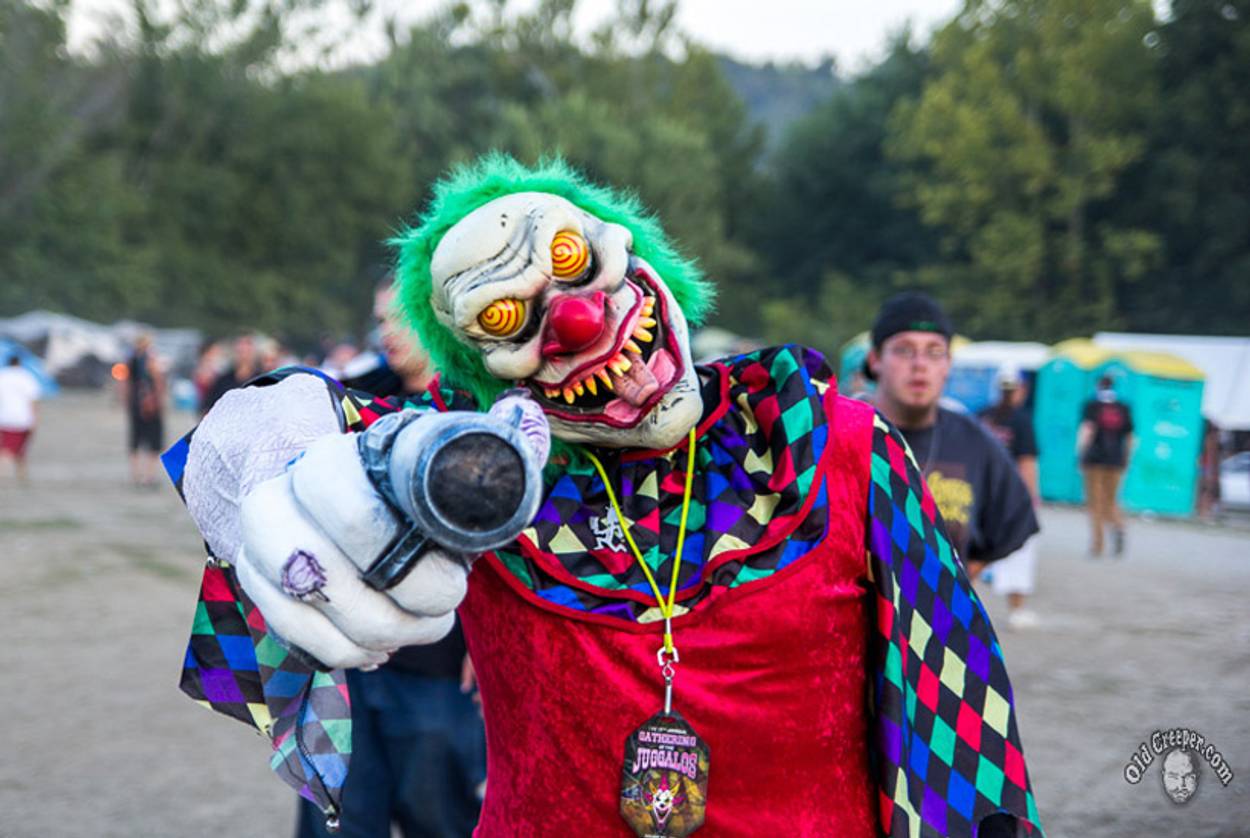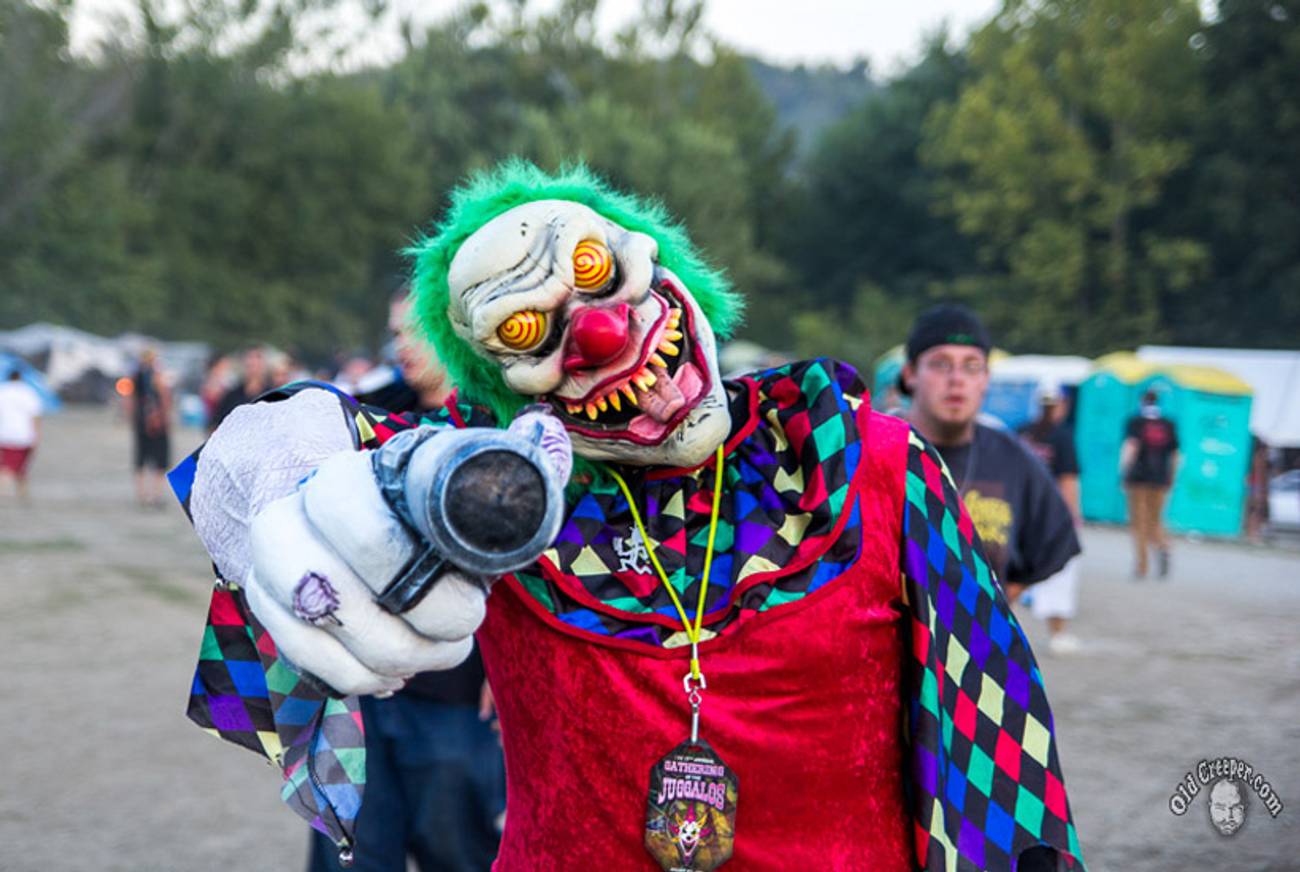Meet the New Piercing-Sporting, Drug-Munching, Rap-Loving Hasidim
The Juggalos, fans of the rap group Insane Clown Posse, are to hip hop what the Hasidic movement was to Judaism




One of the largest annual gatherings of American Hasidim took place this week in the Hog Rock campground in Cave-in-Rock, Ill. Finding comfort and joy in being with their own kind rather than keeping a low profile amid a culture that largely mocks their dress and beliefs, more than 10,000 of the faithful engaged in the traditional expressions of their devotion, which included suspending themselves in midair by means of sharp hooks piercing their flesh, dousing each other’s naked bodies with grape soda, and then washing it off in the poignantly named Lake Hepatitis nearby. And whether they were noshing on Adderall or watching dwarves wrestle in the mud, the Juggalos’ eyes were watching God.
Adherents of the horror-rap group Insane Clown Posse, the Juggalos—the name comes from one of the group’s songs—are more than just committed fans. Their annual celebration, known as the Gathering of the Juggalos, is now in its 13th year, and while its festivities—only the tamest of which were described in the paragraph above—are rowdy, the spirit that prevails is downright religious. Ask any Juggalo about the true meaning of the gathering, and you’ll hear not about sex or drugs or rock ’n’ roll but about family and joy and the divine.
It’s only too fitting: The members of Insane Clown Posse often rap about salvation and damnation, heaven and hell, the Lord and the Antichrist. So deep is their commitment to spiritual themes, and so uncommon their repeated calls to worship God, that a writer for The Guardian speculated in 2010 that Violent J and Shaggy 2 Dope, the two rappers who make up the Insane Clown Posse, are in fact Christian evangelicals whose raucous career and outrageous personae were part of an act designed to lead their fans to Jesus. The group denied these allegations but had no qualms about its fervent belief in the Almighty. “God is in your heart, man” Shaggy 2 Dope told an interviewer. “If you’re doing what’s right and are a good person, then you’re right with God.”
Which, allowing for some discrepancies, makes Shaggy 2 Dope the closest thing we’ve had to the Baal Shem Tov in more than 300 years.
The comparison may be amusing, but it is not frivolous. Hasidic Judaism’s famous founding father, generally speaking, valued ecstasy far more than education and advocated for simplicity, sincerity, and joy and the purest and most direct path to God. Generations of Hasidic rabbis adopted the same belief, often encouraging their followers to connect with the divine by unorthodox means; anyone traveling to the Ukrainian town of Uman next month, for example, will encounter throngs of Reb Nachman of Breslav’s followers as they drink, dance, and search for God in the seclusion of the nearby fields.
The Juggalos, of course, do the same things. They, too, are Hasidim, and not only because they follow a pair of influential spiritual leaders with an exuberant way of worshiping. Just as the Hasidic movement developed as an antithesis to both the overly scholastic approach of most religious Jews at the time and the abandonment of the faith by those Jews embracing secularism and the values of the Haskalah movement, the Juggalos are best understood as a reaction to a host of similar forces changing the face of rap.
First among them is the genre’s Talmudization. Last year, Silicon Valley venture capital firm Andreessen Horowitz invested $15 million in Rap Genius, a website whose sole purpose is to allow users a platform for parsing every word of every rap lyric and offering studious interpretations that hold up against the best tradition of rabbinic pilpul. The site, and its millions of monthly visitors, represents a prevalent attitude among many rap fans who are able to decode the lyrics’ messages—fans for whom the music’s offerings are primarily cerebral. A line like Kanye West’s “last week I was in my other other Benz,” for example, only makes sense if it is understood as a response to an earlier song by Drake that accused West of lying about owning said expensive car. This sort of conceptual contextualization can be fun, but it exercises the mind rather than the feet.
And then there are artists like Lil B, who pursue the cerebral strand even further and produce not so much rap songs as abstractions—or deconstructions—of rap songs. Like Maimonides, whose famous negative theology argued that we can’t say that God is real but only that he’s not unreal, Lil B’s work defines rap in an entirely analytical way; his hit “I’m Miley Cyrus,” for example, features a simple beat and Lil B saying, again and again and again, that he is the famed children’s entertainer. That’s what rap sounds like, reduced to its elements. It’s no wonder that the artist is more comfortable giving academic talks than rap concerts, or that Jay Z is drifting further and further into conceptual high art. Like Judaism and every other text-obsessed belief system, rap, having hit maturity, had nowhere to go but further into its own head, into endless intellectual riddles and cold analytical pleasures.
Sadly, rap’s equivalent of the 18th-century Jewish secularists aren’t much better. From Nicki Minaj to the Black Eyed Peas, they were pleased to abandon the hip-hop shtetl in return for full citizenship in the wider, and often more remunerative, world of pop stardom, and they channeled the immense energies previously reserved strictly for practicing the old religion into a slew of profitable pursuits.
Oscillating between pedantry and disbelief, Judaism forged the Hasidic movement. Shaped by the same two forces, rap gave us the Juggalos. They are far from perfect—associating criminal acts committed by a minority of Juggalos with the group at large, the Federal Bureau of Investigations labeled it a gang, drawing strong criticism—and their predilections, like a penchant for self-mutilation involving the crude removal of male nipples, do often come off as barbaric. But the joy they take in the music, in one another, and in God is real and profound, and if their Hasidic predecessors are anything to go by, they’re not about to disappear anytime soon.
***
Like this article? Sign up for our Daily Digest to get Tablet Magazine’s new content in your inbox each morning.
Liel Leibovitz is a senior writer for Tablet Magazine and a host of the Unorthodox podcast.
Liel Leibovitz is editor-at-large for Tablet Magazine and a host of its weekly culture podcast Unorthodox and daily Talmud podcast Take One. He is the editor of Zionism: The Tablet Guide.